Sustainable Tourism: Environment and Industry Analysis in UK
VerifiedAdded on 2023/06/07
|10
|2697
|491
Report
AI Summary
This report provides an analysis of sustainable tourism in the UK, focusing on its concept, principles, and significance. It discusses the roles of various stakeholders, including the private sector, voluntary sector, and tourists, in ensuring sustainable tourism development. The report also presents macro environmental factors, such as technological innovation trends, environmental trends, and social and cultural trends, that influence the development of sustainable tourism. Furthermore, it examines micro factors affecting tourism demand, including intrinsic and external factors, as well as personality and travel destination choices. The report concludes with recommendations for the UK to enhance its travel and tourism sector, emphasizing the adoption of automation and technology, hygiene factors, and sustainable practices. Desklib offers this report along with a wide range of study tools for students.
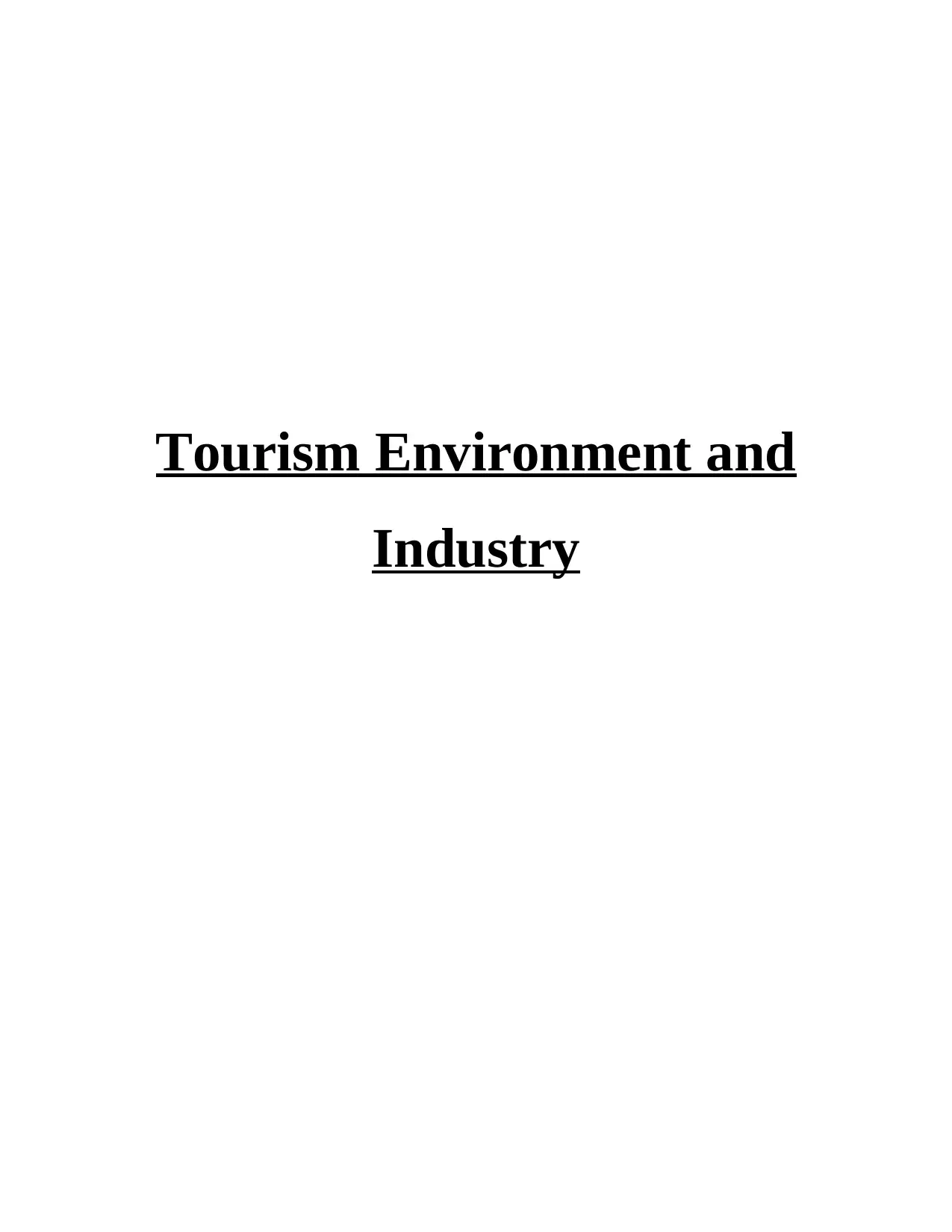
Tourism Environment and
Industry
Industry
Paraphrase This Document
Need a fresh take? Get an instant paraphrase of this document with our AI Paraphraser
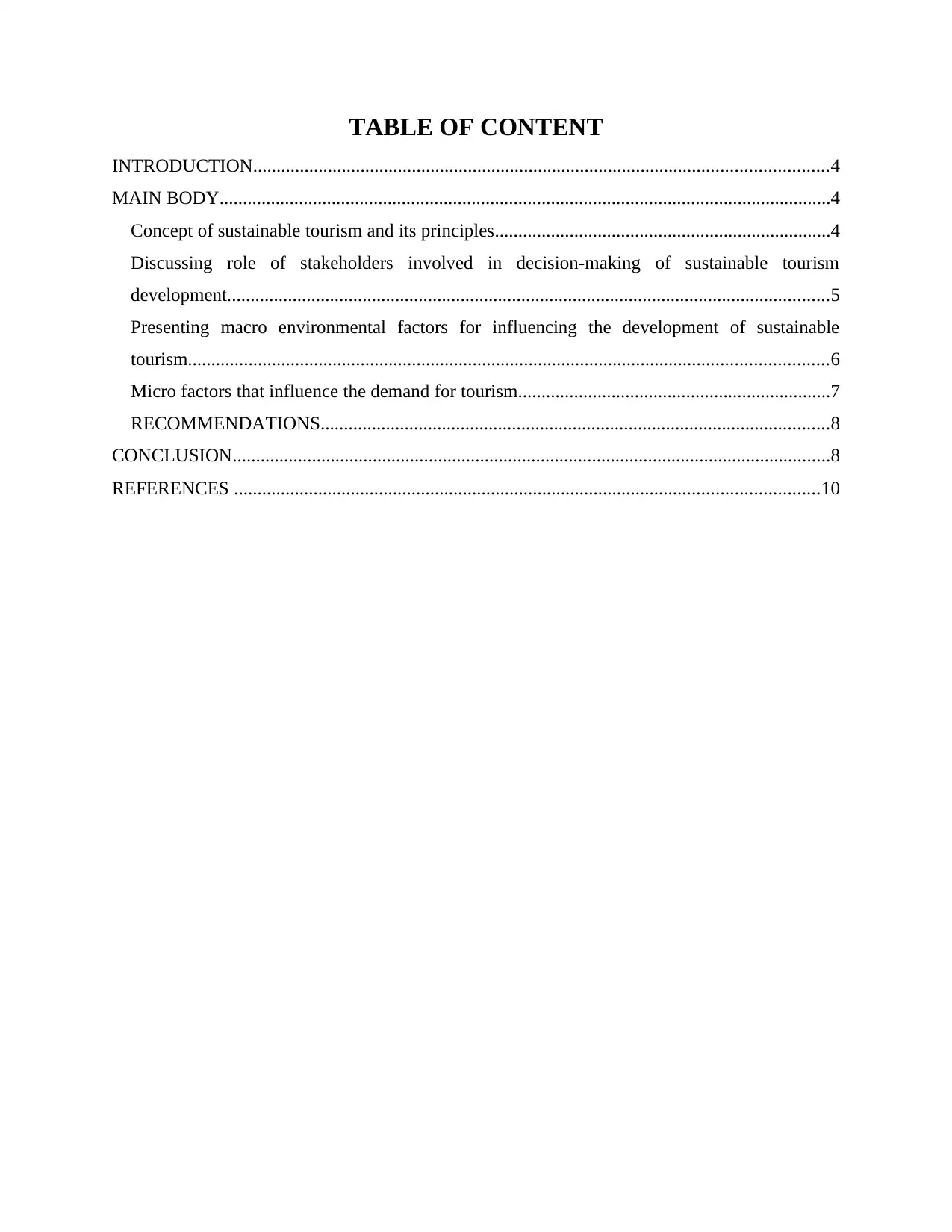
TABLE OF CONTENT
INTRODUCTION...........................................................................................................................4
MAIN BODY...................................................................................................................................4
Concept of sustainable tourism and its principles........................................................................4
Discussing role of stakeholders involved in decision-making of sustainable tourism
development.................................................................................................................................5
Presenting macro environmental factors for influencing the development of sustainable
tourism.........................................................................................................................................6
Micro factors that influence the demand for tourism...................................................................7
RECOMMENDATIONS.............................................................................................................8
CONCLUSION................................................................................................................................8
REFERENCES .............................................................................................................................10
INTRODUCTION...........................................................................................................................4
MAIN BODY...................................................................................................................................4
Concept of sustainable tourism and its principles........................................................................4
Discussing role of stakeholders involved in decision-making of sustainable tourism
development.................................................................................................................................5
Presenting macro environmental factors for influencing the development of sustainable
tourism.........................................................................................................................................6
Micro factors that influence the demand for tourism...................................................................7
RECOMMENDATIONS.............................................................................................................8
CONCLUSION................................................................................................................................8
REFERENCES .............................................................................................................................10

⊘ This is a preview!⊘
Do you want full access?
Subscribe today to unlock all pages.

Trusted by 1+ million students worldwide
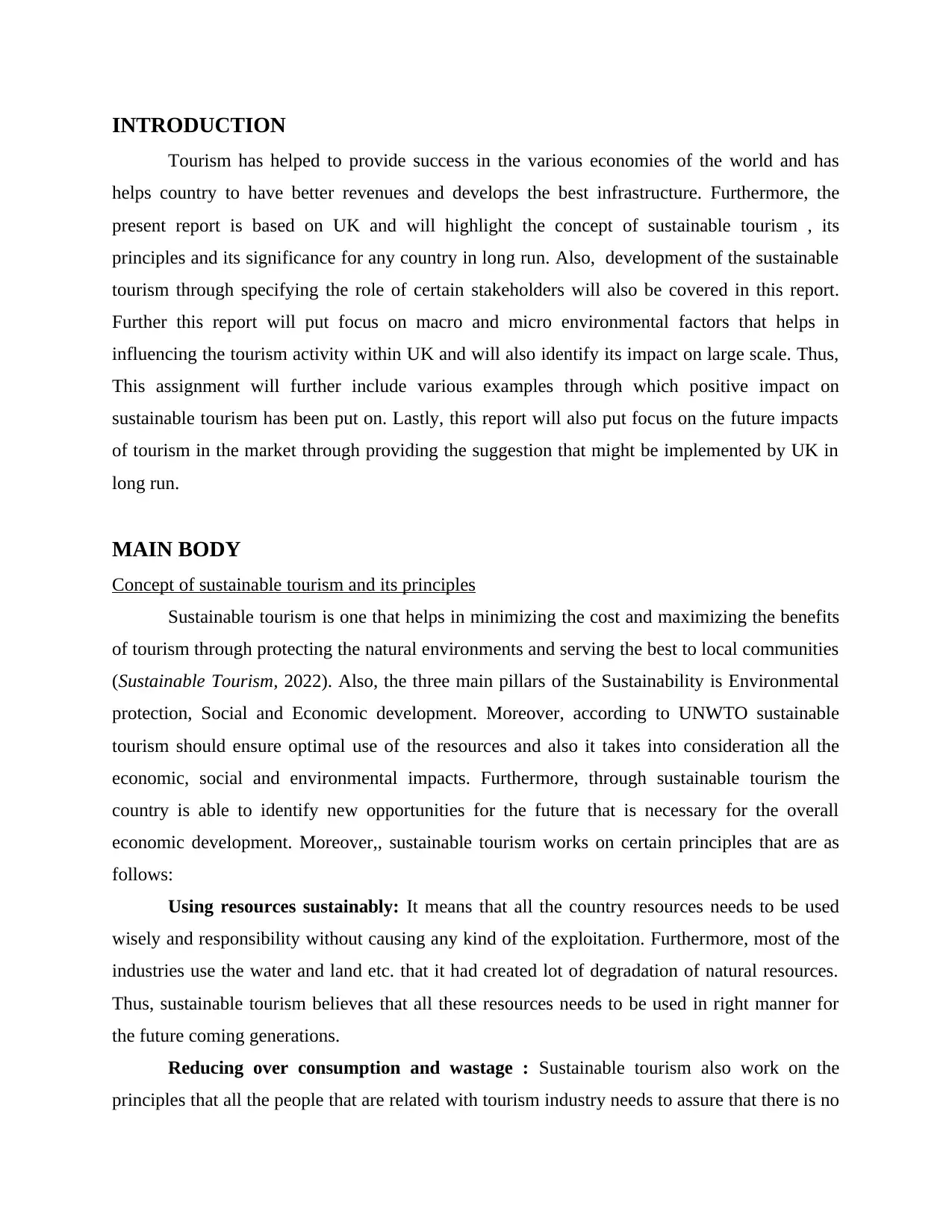
INTRODUCTION
Tourism has helped to provide success in the various economies of the world and has
helps country to have better revenues and develops the best infrastructure. Furthermore, the
present report is based on UK and will highlight the concept of sustainable tourism , its
principles and its significance for any country in long run. Also, development of the sustainable
tourism through specifying the role of certain stakeholders will also be covered in this report.
Further this report will put focus on macro and micro environmental factors that helps in
influencing the tourism activity within UK and will also identify its impact on large scale. Thus,
This assignment will further include various examples through which positive impact on
sustainable tourism has been put on. Lastly, this report will also put focus on the future impacts
of tourism in the market through providing the suggestion that might be implemented by UK in
long run.
MAIN BODY
Concept of sustainable tourism and its principles
Sustainable tourism is one that helps in minimizing the cost and maximizing the benefits
of tourism through protecting the natural environments and serving the best to local communities
(Sustainable Tourism, 2022). Also, the three main pillars of the Sustainability is Environmental
protection, Social and Economic development. Moreover, according to UNWTO sustainable
tourism should ensure optimal use of the resources and also it takes into consideration all the
economic, social and environmental impacts. Furthermore, through sustainable tourism the
country is able to identify new opportunities for the future that is necessary for the overall
economic development. Moreover,, sustainable tourism works on certain principles that are as
follows:
Using resources sustainably: It means that all the country resources needs to be used
wisely and responsibility without causing any kind of the exploitation. Furthermore, most of the
industries use the water and land etc. that it had created lot of degradation of natural resources.
Thus, sustainable tourism believes that all these resources needs to be used in right manner for
the future coming generations.
Reducing over consumption and wastage : Sustainable tourism also work on the
principles that all the people that are related with tourism industry needs to assure that there is no
Tourism has helped to provide success in the various economies of the world and has
helps country to have better revenues and develops the best infrastructure. Furthermore, the
present report is based on UK and will highlight the concept of sustainable tourism , its
principles and its significance for any country in long run. Also, development of the sustainable
tourism through specifying the role of certain stakeholders will also be covered in this report.
Further this report will put focus on macro and micro environmental factors that helps in
influencing the tourism activity within UK and will also identify its impact on large scale. Thus,
This assignment will further include various examples through which positive impact on
sustainable tourism has been put on. Lastly, this report will also put focus on the future impacts
of tourism in the market through providing the suggestion that might be implemented by UK in
long run.
MAIN BODY
Concept of sustainable tourism and its principles
Sustainable tourism is one that helps in minimizing the cost and maximizing the benefits
of tourism through protecting the natural environments and serving the best to local communities
(Sustainable Tourism, 2022). Also, the three main pillars of the Sustainability is Environmental
protection, Social and Economic development. Moreover, according to UNWTO sustainable
tourism should ensure optimal use of the resources and also it takes into consideration all the
economic, social and environmental impacts. Furthermore, through sustainable tourism the
country is able to identify new opportunities for the future that is necessary for the overall
economic development. Moreover,, sustainable tourism works on certain principles that are as
follows:
Using resources sustainably: It means that all the country resources needs to be used
wisely and responsibility without causing any kind of the exploitation. Furthermore, most of the
industries use the water and land etc. that it had created lot of degradation of natural resources.
Thus, sustainable tourism believes that all these resources needs to be used in right manner for
the future coming generations.
Reducing over consumption and wastage : Sustainable tourism also work on the
principles that all the people that are related with tourism industry needs to assure that there is no
Paraphrase This Document
Need a fresh take? Get an instant paraphrase of this document with our AI Paraphraser
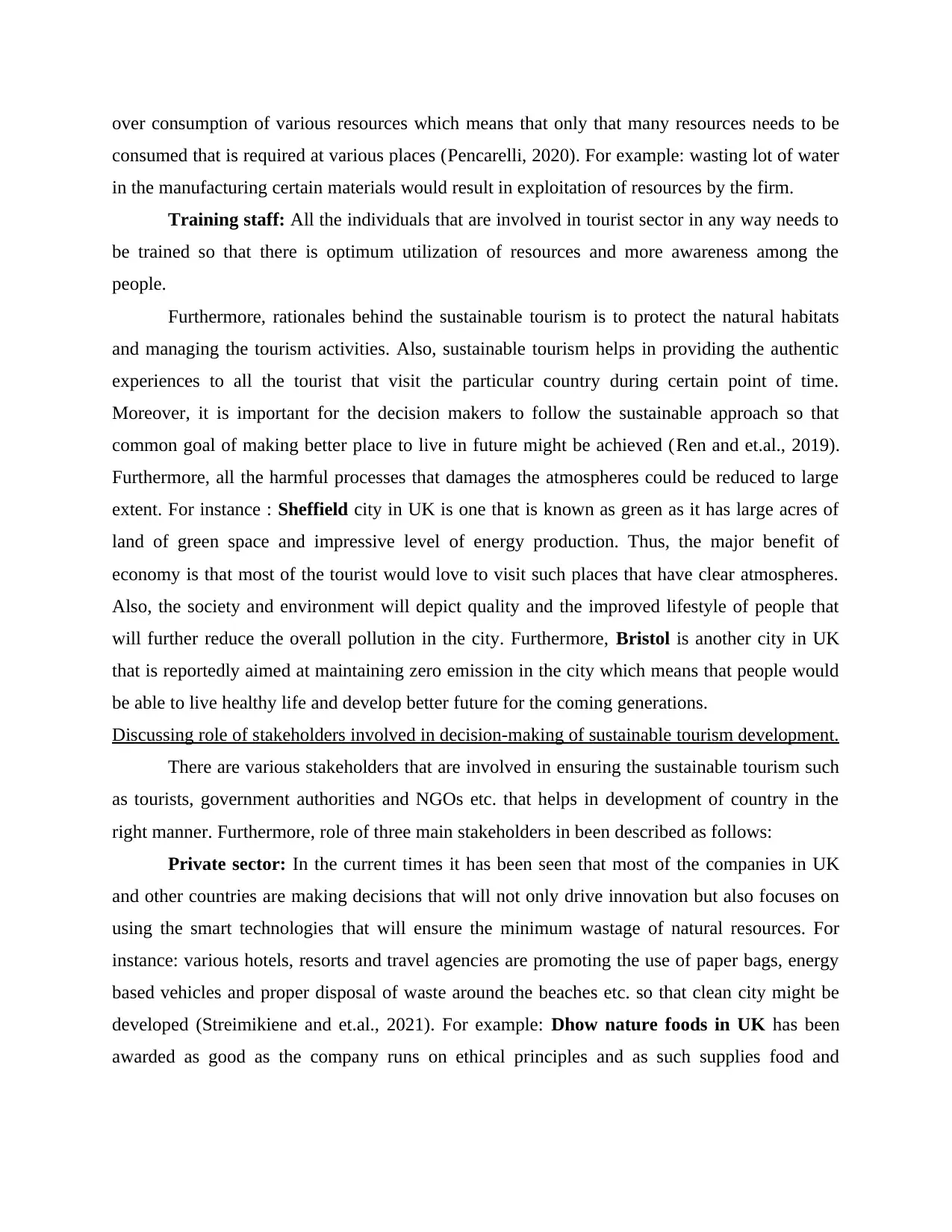
over consumption of various resources which means that only that many resources needs to be
consumed that is required at various places (Pencarelli, 2020). For example: wasting lot of water
in the manufacturing certain materials would result in exploitation of resources by the firm.
Training staff: All the individuals that are involved in tourist sector in any way needs to
be trained so that there is optimum utilization of resources and more awareness among the
people.
Furthermore, rationales behind the sustainable tourism is to protect the natural habitats
and managing the tourism activities. Also, sustainable tourism helps in providing the authentic
experiences to all the tourist that visit the particular country during certain point of time.
Moreover, it is important for the decision makers to follow the sustainable approach so that
common goal of making better place to live in future might be achieved (Ren and et.al., 2019).
Furthermore, all the harmful processes that damages the atmospheres could be reduced to large
extent. For instance : Sheffield city in UK is one that is known as green as it has large acres of
land of green space and impressive level of energy production. Thus, the major benefit of
economy is that most of the tourist would love to visit such places that have clear atmospheres.
Also, the society and environment will depict quality and the improved lifestyle of people that
will further reduce the overall pollution in the city. Furthermore, Bristol is another city in UK
that is reportedly aimed at maintaining zero emission in the city which means that people would
be able to live healthy life and develop better future for the coming generations.
Discussing role of stakeholders involved in decision-making of sustainable tourism development.
There are various stakeholders that are involved in ensuring the sustainable tourism such
as tourists, government authorities and NGOs etc. that helps in development of country in the
right manner. Furthermore, role of three main stakeholders in been described as follows:
Private sector: In the current times it has been seen that most of the companies in UK
and other countries are making decisions that will not only drive innovation but also focuses on
using the smart technologies that will ensure the minimum wastage of natural resources. For
instance: various hotels, resorts and travel agencies are promoting the use of paper bags, energy
based vehicles and proper disposal of waste around the beaches etc. so that clean city might be
developed (Streimikiene and et.al., 2021). For example: Dhow nature foods in UK has been
awarded as good as the company runs on ethical principles and as such supplies food and
consumed that is required at various places (Pencarelli, 2020). For example: wasting lot of water
in the manufacturing certain materials would result in exploitation of resources by the firm.
Training staff: All the individuals that are involved in tourist sector in any way needs to
be trained so that there is optimum utilization of resources and more awareness among the
people.
Furthermore, rationales behind the sustainable tourism is to protect the natural habitats
and managing the tourism activities. Also, sustainable tourism helps in providing the authentic
experiences to all the tourist that visit the particular country during certain point of time.
Moreover, it is important for the decision makers to follow the sustainable approach so that
common goal of making better place to live in future might be achieved (Ren and et.al., 2019).
Furthermore, all the harmful processes that damages the atmospheres could be reduced to large
extent. For instance : Sheffield city in UK is one that is known as green as it has large acres of
land of green space and impressive level of energy production. Thus, the major benefit of
economy is that most of the tourist would love to visit such places that have clear atmospheres.
Also, the society and environment will depict quality and the improved lifestyle of people that
will further reduce the overall pollution in the city. Furthermore, Bristol is another city in UK
that is reportedly aimed at maintaining zero emission in the city which means that people would
be able to live healthy life and develop better future for the coming generations.
Discussing role of stakeholders involved in decision-making of sustainable tourism development.
There are various stakeholders that are involved in ensuring the sustainable tourism such
as tourists, government authorities and NGOs etc. that helps in development of country in the
right manner. Furthermore, role of three main stakeholders in been described as follows:
Private sector: In the current times it has been seen that most of the companies in UK
and other countries are making decisions that will not only drive innovation but also focuses on
using the smart technologies that will ensure the minimum wastage of natural resources. For
instance: various hotels, resorts and travel agencies are promoting the use of paper bags, energy
based vehicles and proper disposal of waste around the beaches etc. so that clean city might be
developed (Streimikiene and et.al., 2021). For example: Dhow nature foods in UK has been
awarded as good as the company runs on ethical principles and as such supplies food and
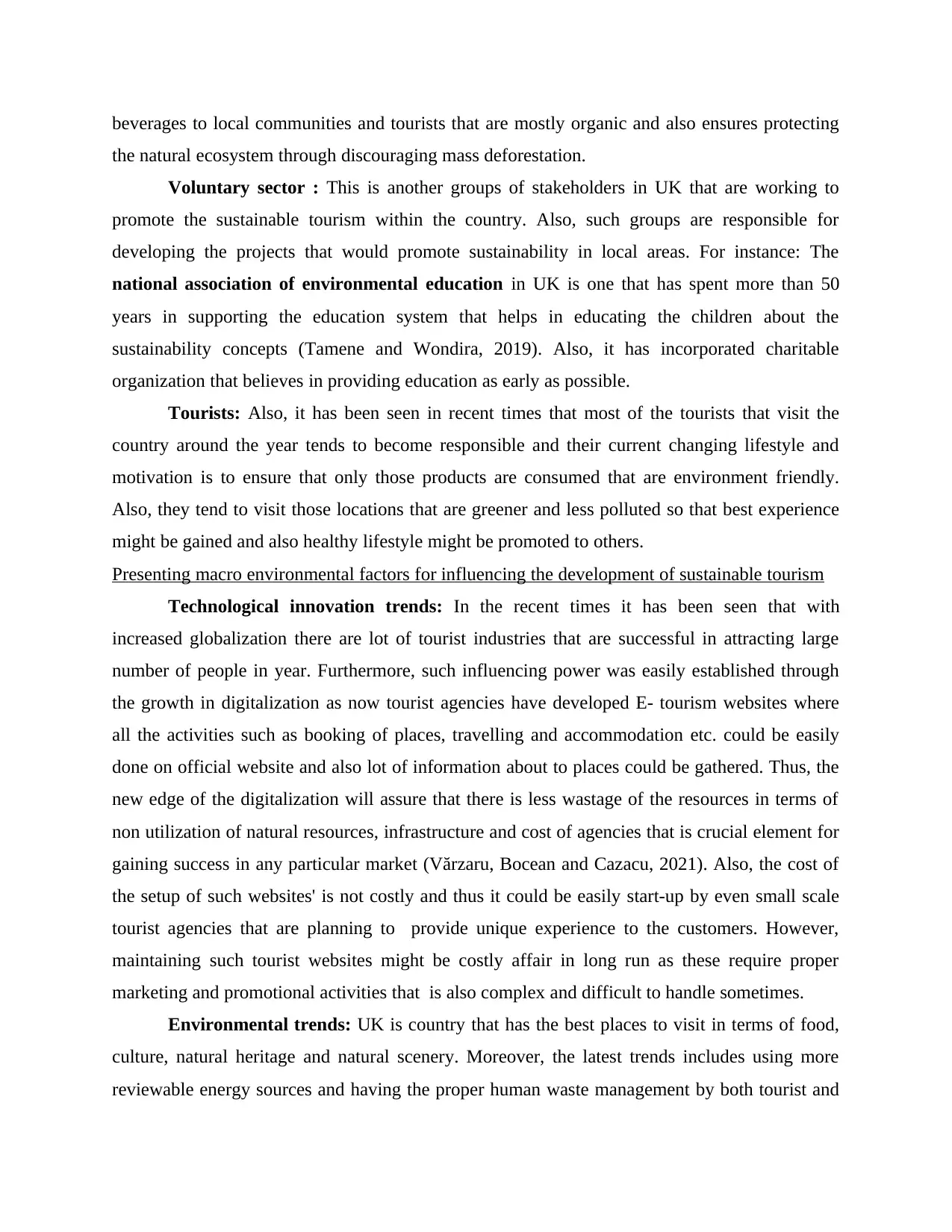
beverages to local communities and tourists that are mostly organic and also ensures protecting
the natural ecosystem through discouraging mass deforestation.
Voluntary sector : This is another groups of stakeholders in UK that are working to
promote the sustainable tourism within the country. Also, such groups are responsible for
developing the projects that would promote sustainability in local areas. For instance: The
national association of environmental education in UK is one that has spent more than 50
years in supporting the education system that helps in educating the children about the
sustainability concepts (Tamene and Wondira, 2019). Also, it has incorporated charitable
organization that believes in providing education as early as possible.
Tourists: Also, it has been seen in recent times that most of the tourists that visit the
country around the year tends to become responsible and their current changing lifestyle and
motivation is to ensure that only those products are consumed that are environment friendly.
Also, they tend to visit those locations that are greener and less polluted so that best experience
might be gained and also healthy lifestyle might be promoted to others.
Presenting macro environmental factors for influencing the development of sustainable tourism
Technological innovation trends: In the recent times it has been seen that with
increased globalization there are lot of tourist industries that are successful in attracting large
number of people in year. Furthermore, such influencing power was easily established through
the growth in digitalization as now tourist agencies have developed E- tourism websites where
all the activities such as booking of places, travelling and accommodation etc. could be easily
done on official website and also lot of information about to places could be gathered. Thus, the
new edge of the digitalization will assure that there is less wastage of the resources in terms of
non utilization of natural resources, infrastructure and cost of agencies that is crucial element for
gaining success in any particular market (Vărzaru, Bocean and Cazacu, 2021). Also, the cost of
the setup of such websites' is not costly and thus it could be easily start-up by even small scale
tourist agencies that are planning to provide unique experience to the customers. However,
maintaining such tourist websites might be costly affair in long run as these require proper
marketing and promotional activities that is also complex and difficult to handle sometimes.
Environmental trends: UK is country that has the best places to visit in terms of food,
culture, natural heritage and natural scenery. Moreover, the latest trends includes using more
reviewable energy sources and having the proper human waste management by both tourist and
the natural ecosystem through discouraging mass deforestation.
Voluntary sector : This is another groups of stakeholders in UK that are working to
promote the sustainable tourism within the country. Also, such groups are responsible for
developing the projects that would promote sustainability in local areas. For instance: The
national association of environmental education in UK is one that has spent more than 50
years in supporting the education system that helps in educating the children about the
sustainability concepts (Tamene and Wondira, 2019). Also, it has incorporated charitable
organization that believes in providing education as early as possible.
Tourists: Also, it has been seen in recent times that most of the tourists that visit the
country around the year tends to become responsible and their current changing lifestyle and
motivation is to ensure that only those products are consumed that are environment friendly.
Also, they tend to visit those locations that are greener and less polluted so that best experience
might be gained and also healthy lifestyle might be promoted to others.
Presenting macro environmental factors for influencing the development of sustainable tourism
Technological innovation trends: In the recent times it has been seen that with
increased globalization there are lot of tourist industries that are successful in attracting large
number of people in year. Furthermore, such influencing power was easily established through
the growth in digitalization as now tourist agencies have developed E- tourism websites where
all the activities such as booking of places, travelling and accommodation etc. could be easily
done on official website and also lot of information about to places could be gathered. Thus, the
new edge of the digitalization will assure that there is less wastage of the resources in terms of
non utilization of natural resources, infrastructure and cost of agencies that is crucial element for
gaining success in any particular market (Vărzaru, Bocean and Cazacu, 2021). Also, the cost of
the setup of such websites' is not costly and thus it could be easily start-up by even small scale
tourist agencies that are planning to provide unique experience to the customers. However,
maintaining such tourist websites might be costly affair in long run as these require proper
marketing and promotional activities that is also complex and difficult to handle sometimes.
Environmental trends: UK is country that has the best places to visit in terms of food,
culture, natural heritage and natural scenery. Moreover, the latest trends includes using more
reviewable energy sources and having the proper human waste management by both tourist and
⊘ This is a preview!⊘
Do you want full access?
Subscribe today to unlock all pages.

Trusted by 1+ million students worldwide
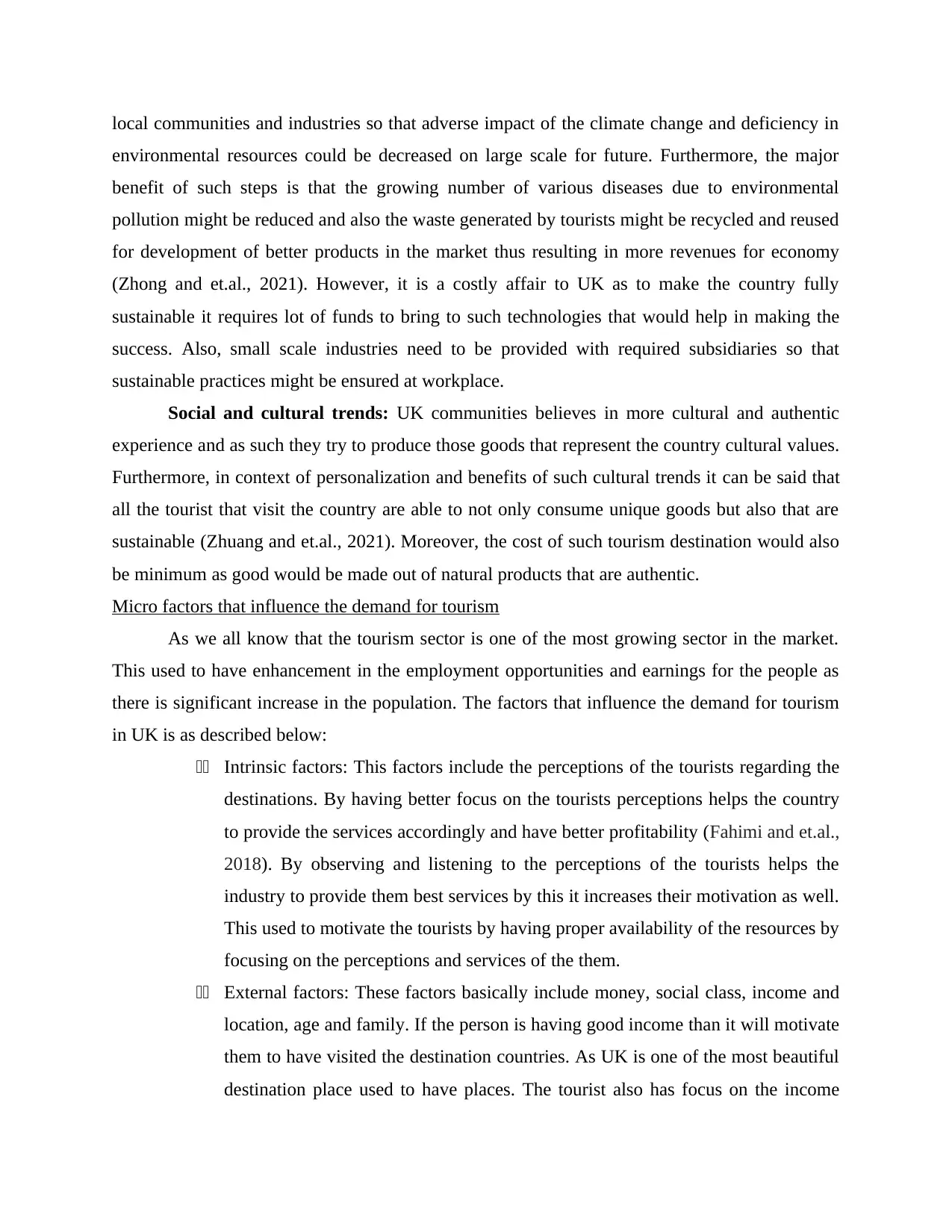
local communities and industries so that adverse impact of the climate change and deficiency in
environmental resources could be decreased on large scale for future. Furthermore, the major
benefit of such steps is that the growing number of various diseases due to environmental
pollution might be reduced and also the waste generated by tourists might be recycled and reused
for development of better products in the market thus resulting in more revenues for economy
(Zhong and et.al., 2021). However, it is a costly affair to UK as to make the country fully
sustainable it requires lot of funds to bring to such technologies that would help in making the
success. Also, small scale industries need to be provided with required subsidiaries so that
sustainable practices might be ensured at workplace.
Social and cultural trends: UK communities believes in more cultural and authentic
experience and as such they try to produce those goods that represent the country cultural values.
Furthermore, in context of personalization and benefits of such cultural trends it can be said that
all the tourist that visit the country are able to not only consume unique goods but also that are
sustainable (Zhuang and et.al., 2021). Moreover, the cost of such tourism destination would also
be minimum as good would be made out of natural products that are authentic.
Micro factors that influence the demand for tourism
As we all know that the tourism sector is one of the most growing sector in the market.
This used to have enhancement in the employment opportunities and earnings for the people as
there is significant increase in the population. The factors that influence the demand for tourism
in UK is as described below:
11 Intrinsic factors: This factors include the perceptions of the tourists regarding the
destinations. By having better focus on the tourists perceptions helps the country
to provide the services accordingly and have better profitability (Fahimi and et.al.,
2018). By observing and listening to the perceptions of the tourists helps the
industry to provide them best services by this it increases their motivation as well.
This used to motivate the tourists by having proper availability of the resources by
focusing on the perceptions and services of the them.
11 External factors: These factors basically include money, social class, income and
location, age and family. If the person is having good income than it will motivate
them to have visited the destination countries. As UK is one of the most beautiful
destination place used to have places. The tourist also has focus on the income
environmental resources could be decreased on large scale for future. Furthermore, the major
benefit of such steps is that the growing number of various diseases due to environmental
pollution might be reduced and also the waste generated by tourists might be recycled and reused
for development of better products in the market thus resulting in more revenues for economy
(Zhong and et.al., 2021). However, it is a costly affair to UK as to make the country fully
sustainable it requires lot of funds to bring to such technologies that would help in making the
success. Also, small scale industries need to be provided with required subsidiaries so that
sustainable practices might be ensured at workplace.
Social and cultural trends: UK communities believes in more cultural and authentic
experience and as such they try to produce those goods that represent the country cultural values.
Furthermore, in context of personalization and benefits of such cultural trends it can be said that
all the tourist that visit the country are able to not only consume unique goods but also that are
sustainable (Zhuang and et.al., 2021). Moreover, the cost of such tourism destination would also
be minimum as good would be made out of natural products that are authentic.
Micro factors that influence the demand for tourism
As we all know that the tourism sector is one of the most growing sector in the market.
This used to have enhancement in the employment opportunities and earnings for the people as
there is significant increase in the population. The factors that influence the demand for tourism
in UK is as described below:
11 Intrinsic factors: This factors include the perceptions of the tourists regarding the
destinations. By having better focus on the tourists perceptions helps the country
to provide the services accordingly and have better profitability (Fahimi and et.al.,
2018). By observing and listening to the perceptions of the tourists helps the
industry to provide them best services by this it increases their motivation as well.
This used to motivate the tourists by having proper availability of the resources by
focusing on the perceptions and services of the them.
11 External factors: These factors basically include money, social class, income and
location, age and family. If the person is having good income than it will motivate
them to have visited the destination countries. As UK is one of the most beautiful
destination place used to have places. The tourist also has focus on the income
Paraphrase This Document
Need a fresh take? Get an instant paraphrase of this document with our AI Paraphraser
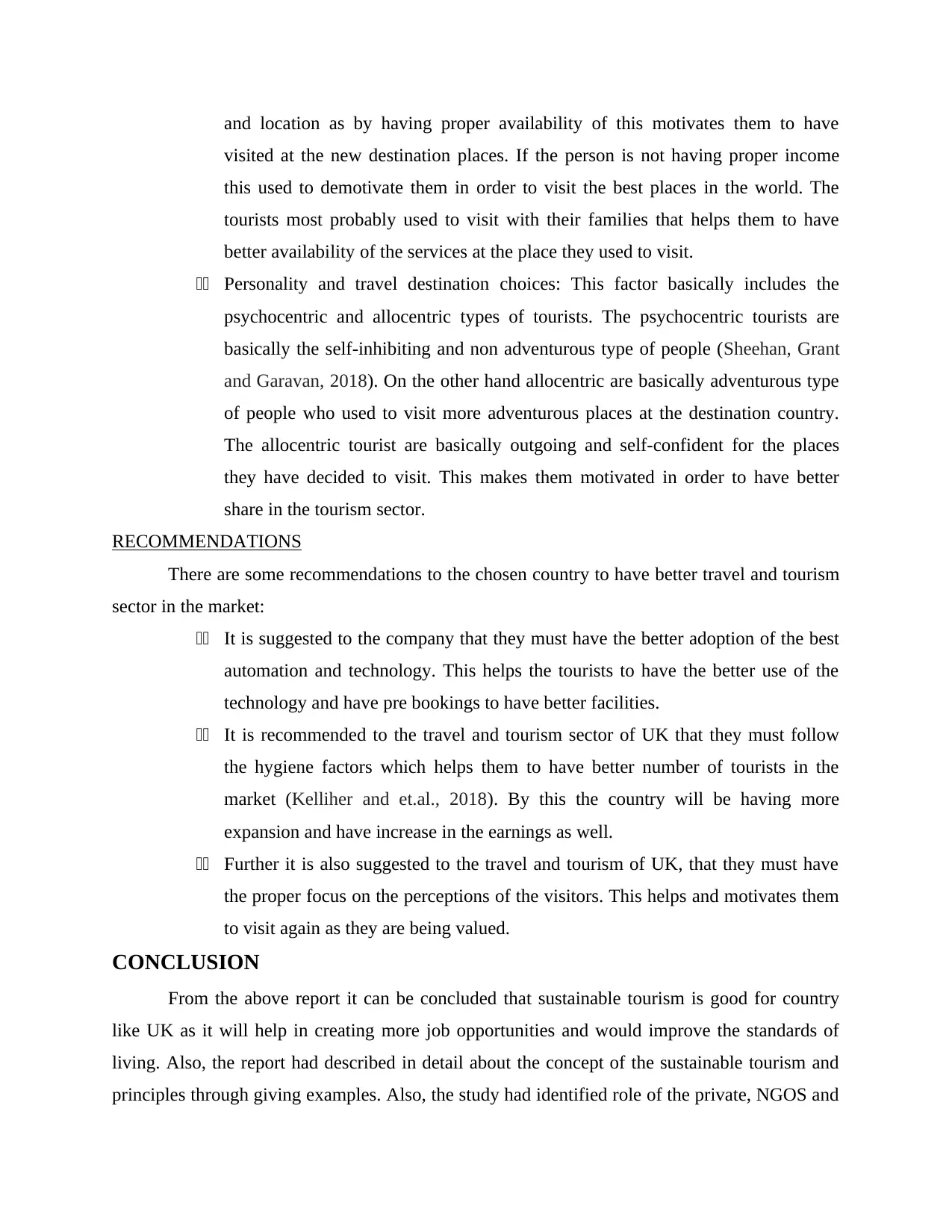
and location as by having proper availability of this motivates them to have
visited at the new destination places. If the person is not having proper income
this used to demotivate them in order to visit the best places in the world. The
tourists most probably used to visit with their families that helps them to have
better availability of the services at the place they used to visit.
11 Personality and travel destination choices: This factor basically includes the
psychocentric and allocentric types of tourists. The psychocentric tourists are
basically the self-inhibiting and non adventurous type of people (Sheehan, Grant
and Garavan, 2018). On the other hand allocentric are basically adventurous type
of people who used to visit more adventurous places at the destination country.
The allocentric tourist are basically outgoing and self-confident for the places
they have decided to visit. This makes them motivated in order to have better
share in the tourism sector.
RECOMMENDATIONS
There are some recommendations to the chosen country to have better travel and tourism
sector in the market:
11 It is suggested to the company that they must have the better adoption of the best
automation and technology. This helps the tourists to have the better use of the
technology and have pre bookings to have better facilities.
11 It is recommended to the travel and tourism sector of UK that they must follow
the hygiene factors which helps them to have better number of tourists in the
market (Kelliher and et.al., 2018). By this the country will be having more
expansion and have increase in the earnings as well.
11 Further it is also suggested to the travel and tourism of UK, that they must have
the proper focus on the perceptions of the visitors. This helps and motivates them
to visit again as they are being valued.
CONCLUSION
From the above report it can be concluded that sustainable tourism is good for country
like UK as it will help in creating more job opportunities and would improve the standards of
living. Also, the report had described in detail about the concept of the sustainable tourism and
principles through giving examples. Also, the study had identified role of the private, NGOS and
visited at the new destination places. If the person is not having proper income
this used to demotivate them in order to visit the best places in the world. The
tourists most probably used to visit with their families that helps them to have
better availability of the services at the place they used to visit.
11 Personality and travel destination choices: This factor basically includes the
psychocentric and allocentric types of tourists. The psychocentric tourists are
basically the self-inhibiting and non adventurous type of people (Sheehan, Grant
and Garavan, 2018). On the other hand allocentric are basically adventurous type
of people who used to visit more adventurous places at the destination country.
The allocentric tourist are basically outgoing and self-confident for the places
they have decided to visit. This makes them motivated in order to have better
share in the tourism sector.
RECOMMENDATIONS
There are some recommendations to the chosen country to have better travel and tourism
sector in the market:
11 It is suggested to the company that they must have the better adoption of the best
automation and technology. This helps the tourists to have the better use of the
technology and have pre bookings to have better facilities.
11 It is recommended to the travel and tourism sector of UK that they must follow
the hygiene factors which helps them to have better number of tourists in the
market (Kelliher and et.al., 2018). By this the country will be having more
expansion and have increase in the earnings as well.
11 Further it is also suggested to the travel and tourism of UK, that they must have
the proper focus on the perceptions of the visitors. This helps and motivates them
to visit again as they are being valued.
CONCLUSION
From the above report it can be concluded that sustainable tourism is good for country
like UK as it will help in creating more job opportunities and would improve the standards of
living. Also, the report had described in detail about the concept of the sustainable tourism and
principles through giving examples. Also, the study had identified role of the private, NGOS and

tourist that visit the country during the year in UK. Furthermore, certain macro sustainable factor
such as technological, Social an environmental trends and their impact had also been presented.
Lastly, the study had discussed micro factors through support of theory and provided certain
recommendations for creating the sustainable tourism activity in the country in the future.
such as technological, Social an environmental trends and their impact had also been presented.
Lastly, the study had discussed micro factors through support of theory and provided certain
recommendations for creating the sustainable tourism activity in the country in the future.
⊘ This is a preview!⊘
Do you want full access?
Subscribe today to unlock all pages.

Trusted by 1+ million students worldwide
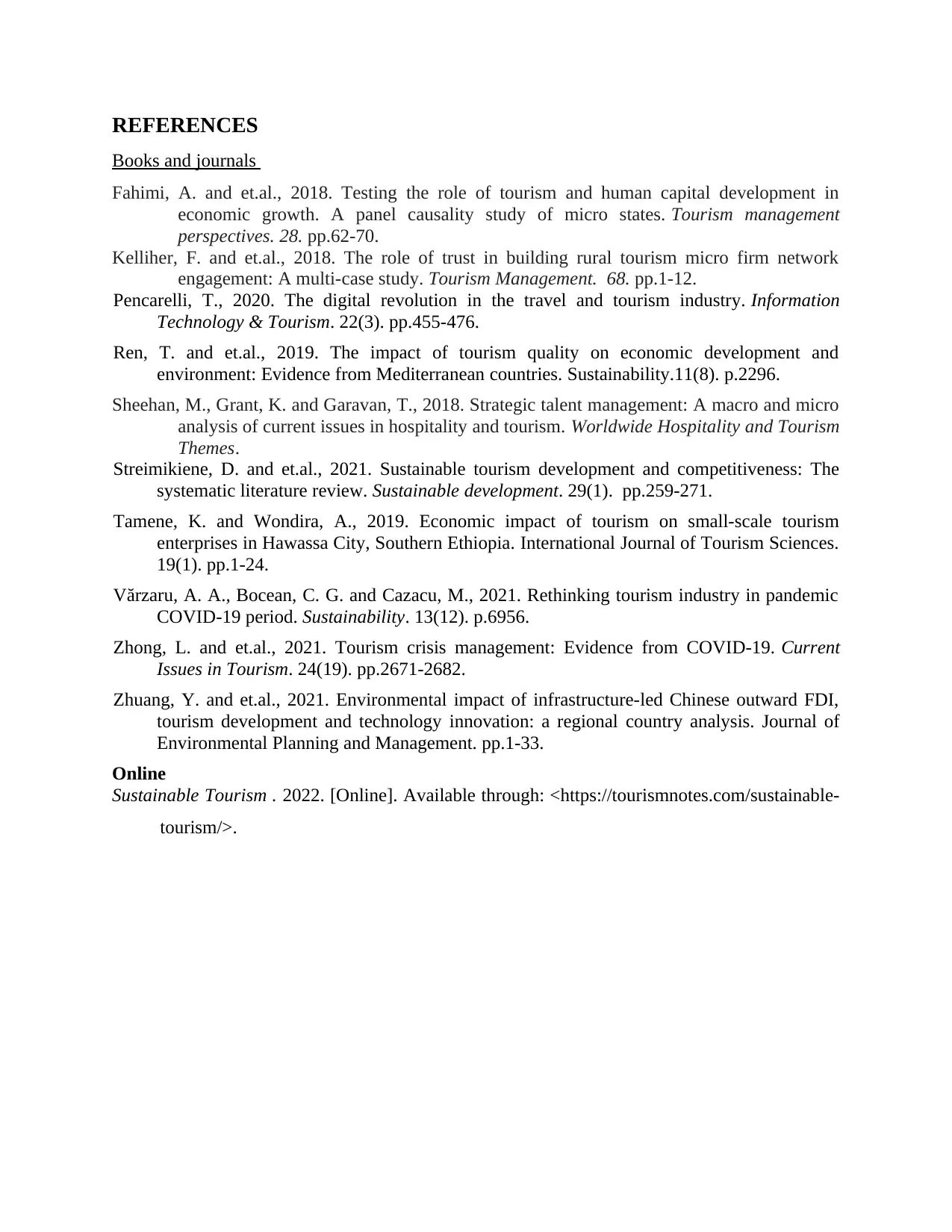
REFERENCES
Books and journals
Fahimi, A. and et.al., 2018. Testing the role of tourism and human capital development in
economic growth. A panel causality study of micro states. Tourism management
perspectives. 28. pp.62-70.
Kelliher, F. and et.al., 2018. The role of trust in building rural tourism micro firm network
engagement: A multi-case study. Tourism Management. 68. pp.1-12.
Pencarelli, T., 2020. The digital revolution in the travel and tourism industry. Information
Technology & Tourism. 22(3). pp.455-476.
Ren, T. and et.al., 2019. The impact of tourism quality on economic development and
environment: Evidence from Mediterranean countries. Sustainability.11(8). p.2296.
Sheehan, M., Grant, K. and Garavan, T., 2018. Strategic talent management: A macro and micro
analysis of current issues in hospitality and tourism. Worldwide Hospitality and Tourism
Themes.
Streimikiene, D. and et.al., 2021. Sustainable tourism development and competitiveness: The
systematic literature review. Sustainable development. 29(1). pp.259-271.
Tamene, K. and Wondira, A., 2019. Economic impact of tourism on small-scale tourism
enterprises in Hawassa City, Southern Ethiopia. International Journal of Tourism Sciences.
19(1). pp.1-24.
Vărzaru, A. A., Bocean, C. G. and Cazacu, M., 2021. Rethinking tourism industry in pandemic
COVID-19 period. Sustainability. 13(12). p.6956.
Zhong, L. and et.al., 2021. Tourism crisis management: Evidence from COVID-19. Current
Issues in Tourism. 24(19). pp.2671-2682.
Zhuang, Y. and et.al., 2021. Environmental impact of infrastructure-led Chinese outward FDI,
tourism development and technology innovation: a regional country analysis. Journal of
Environmental Planning and Management. pp.1-33.
Online
Sustainable Tourism . 2022. [Online]. Available through: <https://tourismnotes.com/sustainable-
tourism/>.
Books and journals
Fahimi, A. and et.al., 2018. Testing the role of tourism and human capital development in
economic growth. A panel causality study of micro states. Tourism management
perspectives. 28. pp.62-70.
Kelliher, F. and et.al., 2018. The role of trust in building rural tourism micro firm network
engagement: A multi-case study. Tourism Management. 68. pp.1-12.
Pencarelli, T., 2020. The digital revolution in the travel and tourism industry. Information
Technology & Tourism. 22(3). pp.455-476.
Ren, T. and et.al., 2019. The impact of tourism quality on economic development and
environment: Evidence from Mediterranean countries. Sustainability.11(8). p.2296.
Sheehan, M., Grant, K. and Garavan, T., 2018. Strategic talent management: A macro and micro
analysis of current issues in hospitality and tourism. Worldwide Hospitality and Tourism
Themes.
Streimikiene, D. and et.al., 2021. Sustainable tourism development and competitiveness: The
systematic literature review. Sustainable development. 29(1). pp.259-271.
Tamene, K. and Wondira, A., 2019. Economic impact of tourism on small-scale tourism
enterprises in Hawassa City, Southern Ethiopia. International Journal of Tourism Sciences.
19(1). pp.1-24.
Vărzaru, A. A., Bocean, C. G. and Cazacu, M., 2021. Rethinking tourism industry in pandemic
COVID-19 period. Sustainability. 13(12). p.6956.
Zhong, L. and et.al., 2021. Tourism crisis management: Evidence from COVID-19. Current
Issues in Tourism. 24(19). pp.2671-2682.
Zhuang, Y. and et.al., 2021. Environmental impact of infrastructure-led Chinese outward FDI,
tourism development and technology innovation: a regional country analysis. Journal of
Environmental Planning and Management. pp.1-33.
Online
Sustainable Tourism . 2022. [Online]. Available through: <https://tourismnotes.com/sustainable-
tourism/>.
1 out of 10
Related Documents
Your All-in-One AI-Powered Toolkit for Academic Success.
+13062052269
info@desklib.com
Available 24*7 on WhatsApp / Email
![[object Object]](/_next/static/media/star-bottom.7253800d.svg)
Unlock your academic potential
Copyright © 2020–2025 A2Z Services. All Rights Reserved. Developed and managed by ZUCOL.

